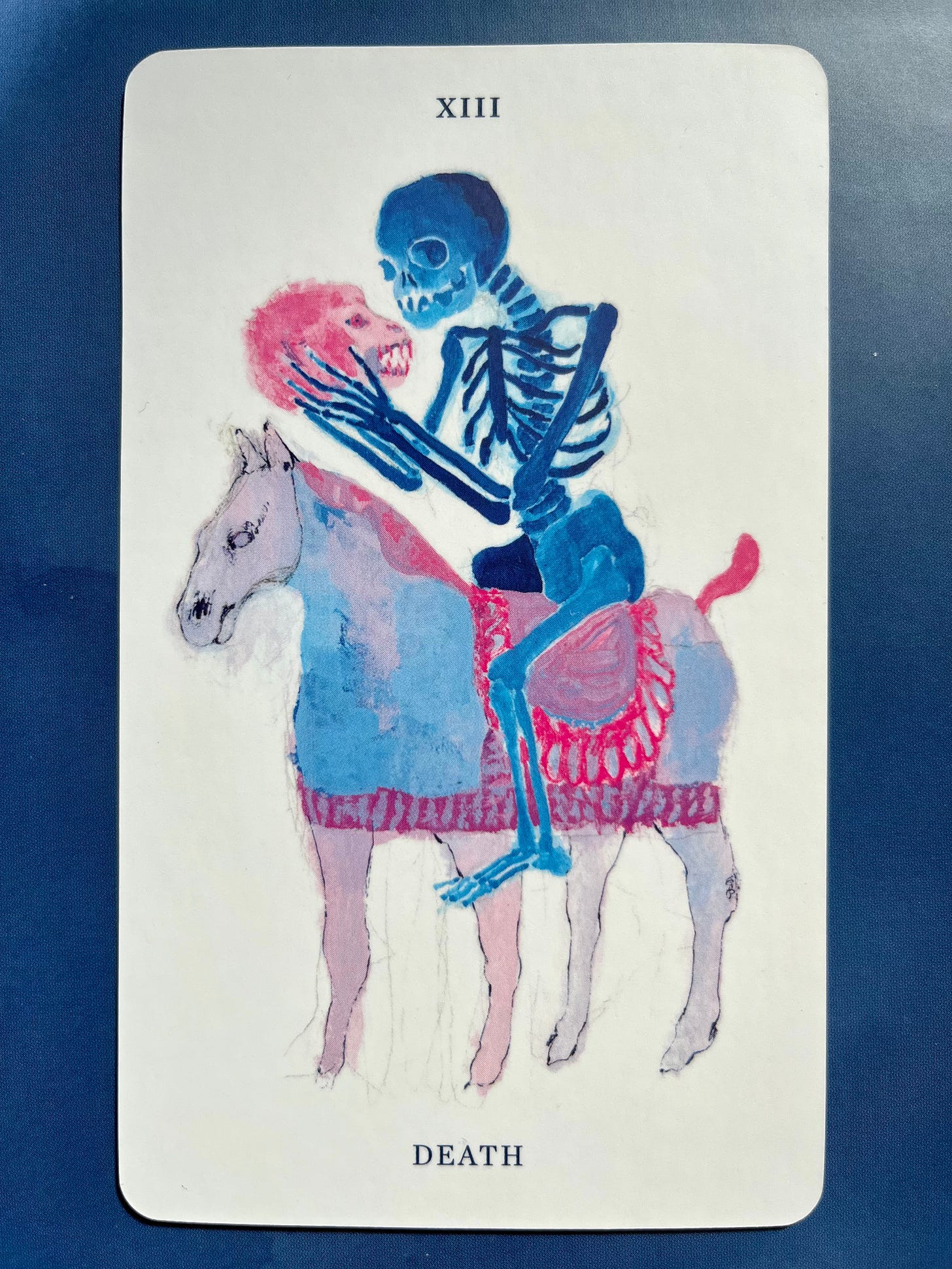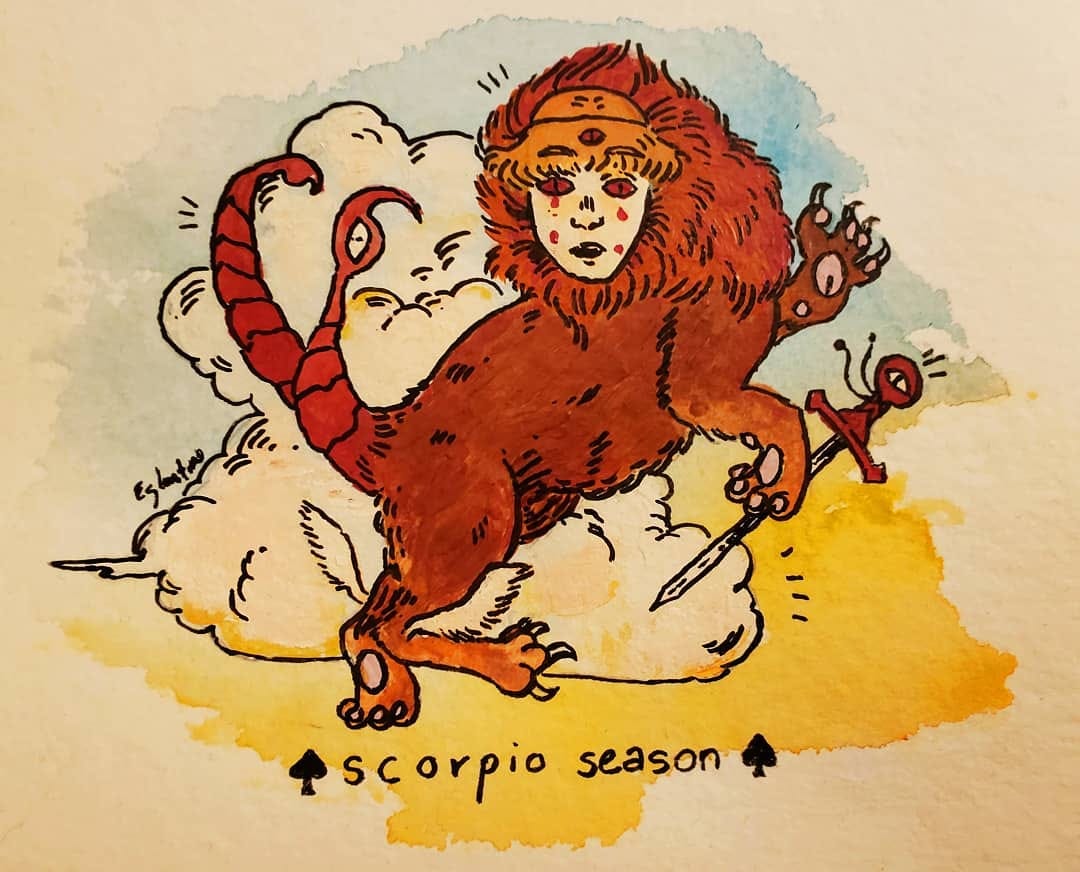The Descent
Illuminating a path through the growing darkness
Welcome. Together we will explore the seasons of change, the mysterious, the marvelous, the cries of the world, and the humanity within. We will ask questions and excavate, we will listen and hold, and we will face where we are and what is to come.
Hello friends, known and new,
Here we are, approaching winter's doorstep, making the descent. Scorpio season, decay, darkness, death, conflicted emotions about life and loss; nature wears it in her hues, humans in their Halloween costumes. Skeletons and ghouls still perched upon lawns and porches across the USA.
Amidst an unfathomable crisis of conscience and human suffering in the Levant, the boiling of our oceans, the breakdown of the structures of “modernity,” and on and on, the horrors of this time are not only decorative; they are real cries, there are real graves. The light wanes, stirring the otherworld of souls and rattling the cages of summer’s buoyancy, of life in technicolor bloom. This is a new, shadowy geography. And there is something here for us.
For me this is the holiest of seasons, not for the intoxicating wooded autumn smells nor the striking expressions of deciduous trees. Rather, in what beckons below the surface, my urge to descend, my craving and desire for a more honest context, the place of disruption, a place to situate and hold the human complexities, the grief, the trauma of lifetimes, an encounter with the gravity of the moment. Not horror films and haunted houses. Not dramatized panic. We needn’t be terrified of and terrorized by the darkness, convinced of its evils, we just need to see it clearly. What I yearn for is a complicated plot and the sophistication of a character who moves gracefully and honestly with their own shadowy entanglements with this messy material world. Here is where we can meet our monsters, only to find they are ourselves.
On this, Bayo Akomolafe writes:
To come to this place, to notice our promiscuous affinities with environment, with ‘objects’, with the non-human, is to walk a messy terrain. And yet, this mess of things frees us and opens us to relationships we never thought were possible, allowing us ‘resources’ beyond the parenthetical remarks of activism, or positivity, or wealth as social mobility. A new ethics of coming undone is stealing into the territory once occupied by advocates of irreducible wholeness. Relationship needs brokenness. Magic is what we call those moments when we meet our fragments. Now we need not travel far to find magic, we can look at the table we rest our desperate elbows on and account for ‘it’, knowing that its ‘mereness’ is only a symptom of modern culture’s denial of the significance of the world outside of its analysis.1
We have tried individualism, privatization, and mastery. Scorpio asks us instead to hand ourselves over and come undone. In astrology, Scorpio season2 beckons us into the wild darkness, not antagonistically, not to conquer, kill, nor even change it, but to reckon with it - because we need to be able to see ourselves implicated in the darkness, to honor that, to “meet our fragments.” Such a process is not so much for our psychologized selves, but for the ways we may then fold back with maturity into our communities, for the ancestors and the generations to come, for the good of the whole.
This is particularly challenging in a capitalist culture, for the ways we bolster ourselves at all costs - and at the expense of other beings - against time’s (inevitable) erosions, mostly through more purchases. Also because we lack appropriate containers and guides for experiences that can facilitate such an undoing. I’m referring to rituals of initiation and ways to process them, individually and collectively, in family, in community, and with elders who might transmit their wisdom and, perhaps more importantly, their cautionary tales. Francis Weller describes an initiatory experience as a “contained encounter with death,” one in which:
the individual is ushered into an alternate reality, outside consensus reality,
there is a radical alteration in the sense of self, and
there is a realization that nothing will ever be the same.3
Initiation, held well, is meant to break us open into a more expansive experience of self, one that is porous, and penetrated by - and part of - all things. “Through this communion, we feel our kinship with the singing, breathing world/cosmos. We become immense and connected to the whole. We fall in love with the world and learn to protect what we love,” Weller explains.4 Might we then begin a different relationship with the “other,” from the table upon which we rest our very elbows to the child suffocating under the exploded rubble of her once-home? The captors and the captives, each of us.
Some of us have been lucky enough to find our way into sacred ceremonies and rituals, but these, too, become avoidant escape hatches if we are not careful. Too many of our neo-spiritual gestures can be solipsistic self-improvement activities, rather than labors of responsibility and reciprocity, offered at the altar of belonging, of sustaining life, of the intimacy with the benevolent - and destructive - tidal waves of existence. Under these circumstances, our liberation is no longer bound together, but individually acquired through the price of admission.
All of this matters when it comes to communing with - and within - other realms, whether through altered states of consciousness or even in meditation. In our desperation to escape the suffering, sometimes we travel so very far from where we are and/or leave our bodies. Some even make that the goal. It's not my goal, not personally and not in my work with others.
Certainly I can appreciate the value of cutting the cord, untethering from the vicissitudes of the mindbody, and venturing right off the edge of the map; it perhaps does something to rearrange our psyches. But the deeper I go into my own work, art, and practices, into my body and somatic expression, into prayer and grief tending and listening to the land, the more I feel that the sacred is nowhere if not here; it is material and dependent upon the living realities of the bodies around me - human, animal, plant, fungal, microbial, mineral, etc. It is not about transcending my flesh, rather coming more fully into matter, enrolling the mindbody, facing and honoring the dynamic, breathing, fermenting, decomposing, recomposing, conflicted reality around and within me, whether it feels “good” or not. It has no brand nor headquarters. It needs no logo, neon sign, nor ad space. The CEO is Mystery herself. It is as simple and bewildering as a single seed holding the blueprints for life - and for death.

This is what I’m attentive to in autumn, the reminders of this inexplicable process of which we are all a manifestation and to which we all contribute. This life-thing that makes no sense, that spurs all of our internal and external conflict, and drives us all towards our own unique brands of madness, self-destruction, and, inshallah, compassion. It means that while we must take care to be safe, we also need to be courageous, together. Aware. Bold. Generous. Forgiving. That may imply something different for each of us. For me, now, it’s a reckoning, a departure, changes. Deepening prayers, stiller stillness, more listening, a sustained gaze, and a refusal to turn away.
May this watery, feminine time of Scorpio beckon you deeper into your own intricacies and intuition, and may we meet there soon. May we turn with integrity towards our darkness, learn together, and walk new paths through the dense bramble. ♥
Akomolafe, Bayo. “We have met the monster, and it is us.” 27 July 2016. https://www.bayoakomolafe.net/post/we-have-met-the-monster-and-it-is-us
See the work of my astrology teacher, Adam Elenbaas (Nightlight Astrology), whose insights influence much of my thinking on the zodiac: https://www.youtube.com/@Adam-Elenbaas
Weller, Francis. In the Absence of the Ordinary: Essays in a Time of Uncertainty. WisdomBridge Press, 2020, p 10-11
Weller, p 11-12


